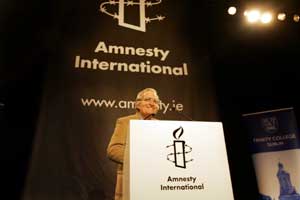26 January 2006 Edition
A triumph of substance over style
BY Justin Moran

NOAM CHOMSKY IN DUBLIN
The repeatedly made similarities between the reception Professor Noam Chomsky got in Dublin last week and that of a rock star were reinforced as we filed out of the RDS last week. Chomsky and his wife were getting into their car as we passed and a clutch of teenage girls in front of us starting calling 'We love you Noam'. Not bad for a man two years short of eighty.
Before that 2,000 people had packed into the Shelbourne Hall of the RDS for the annual Amnesty lecture, co-sponsored by Trinity College and Newstalk 106. RTÉ's Olivia O'Leary, chairing the event, informed the audience that 4,000 people were on the waiting list for tickets giving a taste of the hunger in Ireland for an alternative point of view to the dominant perspective of our establishment media.
There is something surreal about the hold Noam Chomsky has over his audience. A small, almost frail, elderly man standing alone on a platform in front of thousands of people, speaking in a dry, almost monotonous tone, about aspects of international law, broken treaties and the use of language and propaganda manages to maintain an almost hypnotic hold over his listeners.
That he can is because a Chomsky lecture is a triumph of substance over style, of the precise and rational enunciation of facts because, "facts matter, even if we do not like them". Its power is in its understated nature; in its lack of leftist dogma or shrill rhetoric; in his ability to convey complex messages in relatively simple language.
Speaking on the 'War on Terror' he made the case that "...the War was not declared by George W Bush on 9/11, but by the Reagan administration 20 years earlier. They came into office declaring that their foreign policy would confront what the President called "the evil scourge of terrorism... The campaign was directed to a particularly virulent form of the plague: state-directed international terrorism. The main focus was Central America and the Middle East, but it reached to southern Africa and Southeast Asia and beyond."
The mistakes of the '80s being repeated 20 years later with the much the same cast. John Negroponte controlled American-backed death squads in Central America, and now does the same in Iraq. Donald Rumsfeld is the Secretary of Defence today but 20 years ago was Reagan's envoy to the Middle East.
The US, the major source of international terrorism in the world today according to Chomsky, continues to be a country whose foreign policy is shaped by Cold War era neo-conservatives with their eyes fixed on a new empire. They are guilty of what was defined at Nuremburg as "the supreme international crime differing only from other war crimes in that it contains within itself the accumulated evil of the whole", the unprovoked invasion of another country.
But judging by the questions and the standing ovation after he had finished he was speaking to the converted. Elsewhere he was not greeted with such open arms.
The reaction of the right in Irish politics, especially the far right, increasingly prevalent not just in Independent Newspapers but even the Irish Times and judging by Mark Little's shambolic interview on Prime Time, RTÉ, was apoplectic. Few men can have had as many lies told about them in as many papers in as short a time.
Perhaps the vitriol was so great because the underlying message that Chomsky brings is that the truth does not appear in the pages of newspapers owned by people with a vested interest in the maintenance of the status quo.
He encourages people to challenge what they are told. Perhaps the most basic message he brings is that: "I think it only makes sense to seek out and identify structures of authority, hierarchy, and domination in every aspect of life, and to challenge them; unless a justification for them can be given, they are illegitimate, and should be dismantled, to increase the scope of human freedom."
In reminding us to always question authority, not just of the State but of the media, Chomsky delivers a revolutionary message that will long outlast the war on terror.
• The text of Professor Chomsky's lecture can be found on www.amnesty.ie


